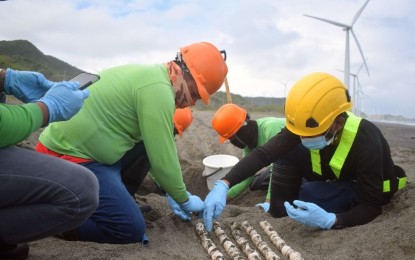
TIME TO MOVE. Workers of the Northwind Development Corp. in Bangui, Ilocos Norte relocate sea turtle eggs to a guarded hatchery in this undated photo. The move aims to keep them safe during high tides and protect them from predators. (Photo courtesy of Northwind Corp.)
LAOAG CITY – Residents of the coastal towns of Bangui and Pagudpud in Ilocos Norte guard and protect the nests of endangered sea turtles or pawikans that lay their eggs along the shorelines.
Due to the continuing marine turtle conservation awareness and training of the NorthWind and North Luzon Renewables in Bangui and Pagudpud towns, popular habitats of marine turtles are emerging, Raymond Sesuca, stakeholder engagement manager of the Ayala Group-led wind farms, said on Friday.
Three species can be found in Ilocos Norte -- Green Sea turtle, Hawksbill Sea turtle, and Olive Ridley Sea turtle.
The Ilocos wind farms - the 52-megawatt NorthWind in Bangui and 81-megawatt North Luzon Renewables in Pagudpud - initiated the sea turtle conservation program in 2013.
Records show at least 24 nesting sites were monitored, over 1,000 hatchlings were released, and 30 sea turtles were rescued and released since the program started.
Whenever local fishermen encounter a stranded sea turtle in the area, they immediately record and report this to local authorities as they help return to the wild, Sesuca said.
He said before this intervention, local communities had a different understanding of their environment and the inherent value that pawikans contribute to their local heritage often leading to poaching.
To reverse this behavior, personnel of the Ilocos wind farms began a grassroots approach to educate the local stakeholders about the benefits of Pawikan conservation for their livelihood.
“Back in 2005, we would only see one, two, three—maybe up to five pawikans around here. The number of pawikans laying their eggs in Bangui Bay has increased, and we have been able to rescue hundreds of eggs with a hatching rate of 80 percent,” Sesuca added.
This February, residents attended their latest training on how to protect these turtles.
Meanwhile, Ed Angadol, wind farm’s forestry senior manager, said the residents are now fully aware that sustainable practices help protect the marine biodiversity that surrounds them.
"Through the Pawikan Conservation initiative, we hope to be an example and an inspiration so that everyone can see that progress and caring for the environment can go hand in hand,” he added. (PNA)
